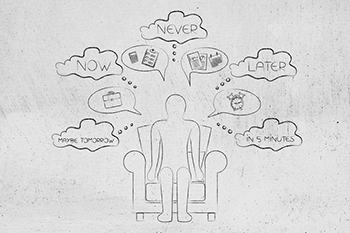 There is no shortage of time management best practices. But when you run a company, especially a family-owned business, it can be difficult finding the ones that work best. Here are five amazing ways both individuals and organizations can boost productivity and turn more of their time into revenue.
There is no shortage of time management best practices. But when you run a company, especially a family-owned business, it can be difficult finding the ones that work best. Here are five amazing ways both individuals and organizations can boost productivity and turn more of their time into revenue.
Why You Are Failing at Time Management
Before we get into the five tips for maximizing your productivity, it’s helpful to look at the existing roadblocks. What things are you currently doing (or not doing) that are stunting the productivity and growth of your business? No matter what your industry is, chances are one or more of the following are eroding your productivity.
You Are Not Making the Most of Idle Time
Jerry B. Jenkins, who's written over 195 books, famously noted than when writing a novel you don’t find the time to write, you make the time to write. What Mr. Jenkins is saying, in a sense, is that everyone has more time than they think they have to do what they really want to do.
[quotes]It’s just a matter of priorities.[/quotes] You have to start prioritizing the way you’re spending your time and then find ways you can reduce non-helpful practices to become more productive.
So, step back and take a look at your situation. What things are you currently doing that add nothing to the business output that matters?
You Value Staying Busy Over Being Productive
Ever get to the end of the day feeling worn-out but no closer to where you want to be than you were at the start of the day? This is where you take a critical look at which actions you took to pass the time. Your goal is to avoid the little things that don’t matter.
Those things, whatever they may be, are keeping you busy. But they’re far from productive. Don’t fool yourself into thinking that you’re getting things done just because you stayed active doing one thing or another. In the long run, you’ll fall further behind. And, that can only increase the drain on your business.
You Drain Your Employees
Piggybacking off that last point, it’s important to note that your poor use of time and favoring of busy-ness over the business can affect your employees. Not in a good way, either.
You have to keep in mind that your employees are people with less of a vested stake in the success or failure of your business. Sure, they want it to be successful and they’d like to be an integral part of it. [quotesright]But their first loyalty is to themselves and their families. [/quotesright]
That means they value their personal time. Jobs that eat into lives and time without a clearly stated purpose will only kill their will to work.
In no time, they’ll be sending out resumes. Consider changing things up for your employees by allowing remote work or creating a rewards system of extra days off or devising other special incentives tailored to your company and workforce.
You Take on Too Much Yourself
Small business owners have to take on a lot by themselves, especially when just starting out. One of the hardest things to do is to know when to let go and seek the help for certain matters.
If you feel like you’re taking work home with you, like there’s never enough time to get things done, like you’re the supervisor of every department in your business, then it’s time to delegate. [quotesright]Stop burning yourself out! [/quotesright]
Now that we know the time-killing practices that are probably holding back your business, it’s time to think smarter. These are the five things every small business must do to be more productive.
1. Get an Early Start
The first of the time management skills to learn is getting an early start. Whether you’re a morning person or not, early risers get more done.
And, it’s not necessarily because they have more time to work. In fact, many of the most productive people in the world start their mornings early with activities that have little to do with their businesses. They understand the mind and body have to be in sync. They know there’s real value in taking some “Me Time” early on to set a productive tone for the day.
Start setting your alarm clock and getting up early with purpose. Here’s how you can do that:
- Get Physical. Do things that feed your mind, body, and spirit. Start the day by getting your body active. This can be something as simple as walking in place or as extreme as taking a cold shower.
- Get Your Head in the Right Space. Once your body is awake, it’s much easier for the mind to follow. Consider working in a light yoga routine, meditation/prayer time, or some timed reading (e.g., news, books, magazines). These types of practices will get your mind and spirit in sync. They’ll put you in the right headspace to tackle the challenges of dealing with people and running a business.
- Go Analog. We have become so dependent on our phones and electronics as a society. Stop making AI do all the creative thinking for you. [quotesright]Ditch all the bells and whistles and reconnect with the pen and paper. [/quotesright] In fact, you might consider not even looking at your phone for the first hour or two of the day. Turning to the analog world or good old pen-and-paper for your to-do lists can help you come up with more creative solutions to the challenges of the day.
2. Stop Being a Clock-watcher
Our second employee time management tip is to free yourself of the timeclock. It’s important that you do this for both yourself and your employees.
On a personal basis, it’s a better use of your time to focus on accomplishments rather than how many hours of work that you’ve logged. On the employee side, no one likes to feel as if their boss is constantly micro-managing them. A weaker emphasis on clock-watching will nurture a healthy work environment for everyone.
Spend Less Time Reporting on Time
You’ll want to start this off the right way by ditching every practice that forces an employee to account for each individual day. Instead, help them to establish clear goals and break those goals down into actionable steps.
Set Measurable Objectives
What you’ve just done in the section above is set a measurable objective. So, what do you do once that measurable objective is accomplished?
You measure it! Work with the employee (or yourself if you’re still a one-person operation) to understand what worked well, what didn’t, and what could be done to get a better result next time with less of a time investment.
3. Keep Work at Work as Much as Possible
Any worthwhile corporate time management class will emphasize the importance of downtime for employees. Large, successful companies understand things like work-life balance. [quotesright]One of the best things you can do to establish a work-life balance is to leave work at work. [/quotesright]
That’s harder to do now that we live in a world of smartphones and cloud-based access. It’s up to you as a small business leader to ensure that employees are getting the breaks they need. And don’t forget that you need them to take those breaks.
It can be tough when it’s your name and reputation at stake. But we promise you, the moment you make a concerted effort to keep personal and work time as separate as possible, the better the quality of your work will be.
Learn How to Disconnect
This is where it gets really difficult. Fortunately, technology has made it a little easier for us by establishing things like autoresponders and Do Not Disturb functions into their operating systems. Make use of these things when necessary.
Life-and-death situations are not common in the business world. Whatever you’re missing out on in those hours from 5 p.m. until bedtime (or whatever your hours of downtime are) will keep.
 Know the Difference Between an Emergency and Everything Else
Know the Difference Between an Emergency and Everything Else
One more thing before we leave this topic. Emergencies involve the immediate threat of life or property loss. Everything else can wait until morning. Think of what you need to accomplish this way:
- There are A priorities that must be dealt with now,
- B priorities that are important but not urgent,
- C priorities that can wait but need attention, and
- D priorities that you might get around to. but if you don’t it won’t be a problem.
- Are there any “F” priorities?
Work your way down your to-do list so the D priorities don’t somehow end up replacing B priorities.
4. Learn How to Delegate
Of all the things you’ll need in your time management plan, this is probably the most valuable. With any luck, you plan on growing your business beyond what it is now. Growing a business involves learning how to bring in others and make them as productive as you’d like them to be.
That doesn’t happen if you keep it all to yourself. To do it effectively, you have to learn how to delegate. This involves taking the following steps.
Nurture Talent
Learn how to recognize talent and distribute greater amounts of responsibility in smaller increments. This will help build the confidence of your employees. It’ll also help you feel more at peace when the time comes to delegate.
Do Not Fear Mistakes
People make ’em! Think back to when you were first learning. What mistakes did you make, and how did you overcome them?
Your employees or contractors are up against that same learning curve. Give them a steady hand and the same patience you afforded yourself in getting to where you are now.
They may – no, they will – screw up. But it won’t be anything colossal enough to end your company. And they’ll come out of those screw-ups much more capable.
[quotesright]View and use mistakes as an opportunity to learn and improve people and processes. [/quotesright] It’s not about placing blame, it’s about learning what to do so similar situations are handled better next time.
5. Reduce Busywork and Distractions
Our last suggestion is to eliminate the busywork that you lay on your employees. Just like they want their personal time valued, they want their work time as well. It’s no joy to an employee – whether they’re getting paid for it or not – to do something beneath their abilities when they could be spending that time with family.
Likewise, you’ll want to get rid of any distractions at the worksite that you can. Look at both the physical and digital environments your employees are working in and provide them with what they need to do their jobs – no more, no less.
6. SECRET EFFECTIVENESS BONUS: The Key to Maximum Productivity and Using Your Time Effectively
Every night before you end the day, create a prioritized list of everything you need to do tomorrow to move your company, department, your job and yourself forward most effectively. Planning and prioritizing what you will do tomorrow makes you maximally productive and focused. (Need help tackling those tough or unpleasant tasks on your list? Ask us how to eat a frog! (We’re not kidding, it’s a fantastic technique that we’ll gladly share with you.)
These Time Management Best Practices Will Optimize Your Productivity
We hope you’ve enjoyed this look at our five favorite time management best practices. More than that, we hope that you can start putting them to use right away.
Good luck! Any questions of your own about growing your business or making you and your team more productive? Get in touch, I’ve got a lot of tips to share with you. Brian Tracy USA: 877.433.6225 Email Me














